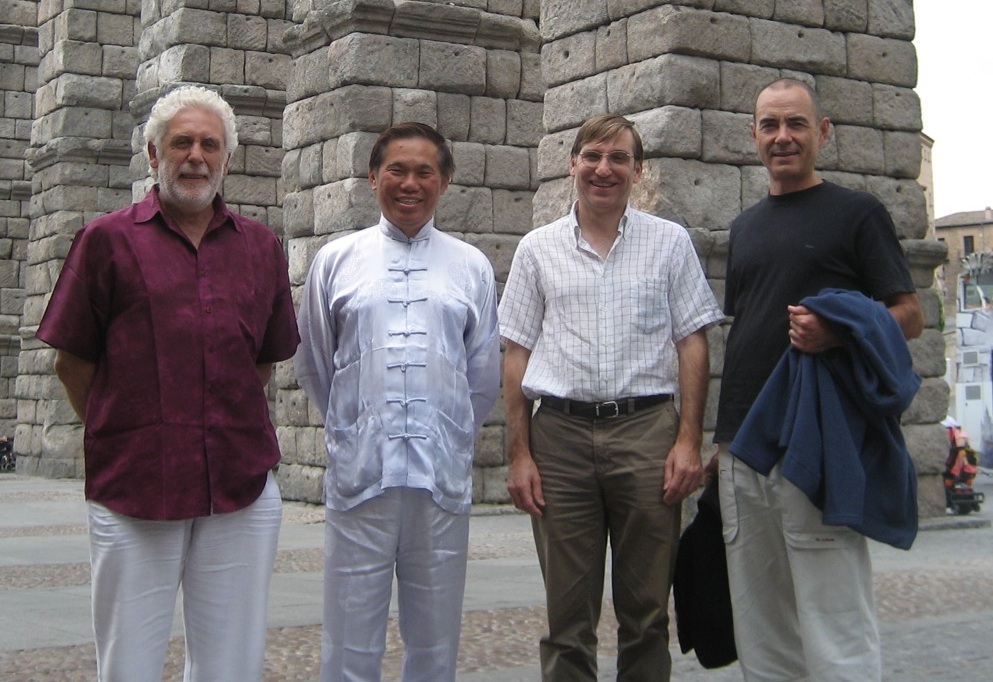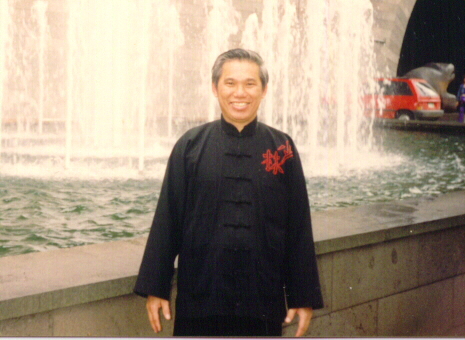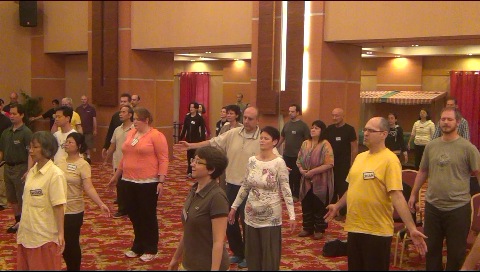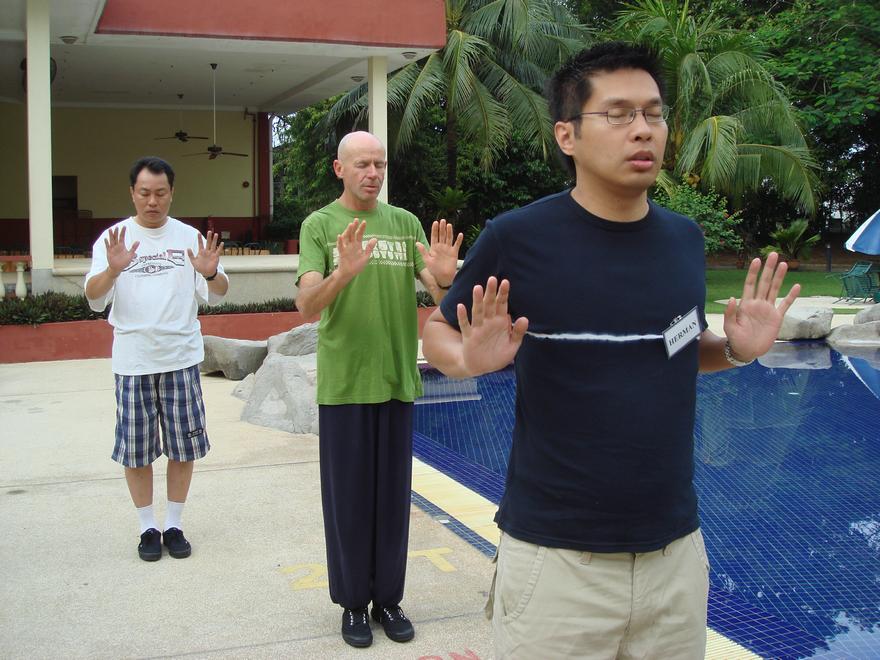SELECTION OF QUESTIONS AND ANSWERS
JANUARY 2015 PART 1

Feeling joyful everyday
Question 1
Thank you once again for being my Sifu. I feel like my training is improving these days. I feel more joyful and I am starting to see from my own experience that every moment in life can potentially be in joy and bliss.
I do not always have the presence of mind or the skill to access this joy but when I do the right things it seems to me it is always there. I used to feel very depressed and lost, so while what I have said could be obvious to many "naturally happy" people, to me it is a massive improvement in my life and a change for the better.
— Mike, United Kingdoms
Answer
Congratulations for your great achievement. Finding joy in daily life is indeed a great achievement, especially so when you used to be depressed in the past.
Many people, including those who are famous and rich, may not find joy in their daily life. Yet, to be joyful is free. Of course it needs a right mind set.
Question 2
You have mentioned that when you were younger you tried fasting for extended periods as an idealistic aim to help world hunger. I believe you called the practice "bi gu" or something similar.
Did you try other experiments like this and could you describe them and what you learned from the process? I am interested in change and development from this experimental period in your life into your current teaching method and style that we all know and love.
Answer
I tried "bi gu", which literally means "abstinence from grain" and figuratively means "not taking solid food", about 30 years ago for about 20 days. I was quite comfortable with my abstinence from food, and could have carried on longer, but I stopped because of a graduation dinner of a chi kung class in Port Dickson, which was about 500 km away from my home, and which I travelled weekly to teach.
I thought that when students invited me for a graduation dinner, it was not a right thing to do to tell them that I abstained from food, especially when they knew I loved delicious food while not undergoing "bi gu", which they and many people at the time were unaware of my doing as I did not exhibit any outward signs of "bi gu". In other words, apart from not eating I carried on joyful life as usual, like sparring vigorously with my kungfu students and teaching chi kung enthusiastically.
I cannot remember exactly whether I specifically started fasting for extended periods as an idealistic aim to help world hunger, but I can remember clearly that I read about "bi gu" and believed I could do it though I did not learn it from my sifus before, and that if I was successful I could teach it to people, like in Africa, to help them fight off famine.
However, soon I realized that people facing hunger would have to spend quite some time to acquire the skill of "bi gu", and by that time they might have died of hunger. Moreover, in their condition they were unlikely to learn chi kung, even when there was a possibility, but not a guarantee, that they could acquire the skill of abstaining from food. Teaching them economics, especially resource management, not necessarily by me, would be more useful.
A few chi kung skills, which were more a case of meeting expedient needs than of experiments, were related to food. When I taught in Kuala Lumpur, which was notorious for traffic jams, I sometimes had to miss my meals. So while sitting inside my car, instead of inside a restaurant, I gently breathed in cosmic energy into my stomach. It worked. Although it might not be tasty as delicious food, it kept me from hunger.
On the other hand, when I had time to enjoy food, and when the food was delicious, I could eat much more than what it would normally constitute a meal. This inspired a student to comment that chi kung was fantastic; it enabled a practitioner to eat three meals at one time, or to do away with three meals if necessary. That was 30 years ago. Now it seems I prefer cosmic energy to extra food.
My ability to go without food yet without suffering the pangs of hunger enabled me not only to teach my classes on time but also to the best of my ability. The saying, "a hungry man is an angry man", did not apply in my teaching. With hindsight, I think my realization that starving people would not be interested to learn "bi gu" might have contributed to my teaching philosophy today that we only teach to deserving students who want to benefit from our teaching. This means we do not want to waste time on people who doubt us.
If students prefer to be punched and kicked in their martial art training instead of learning an art that gives them vitality and joy, or patients prefer to continue medication that cannot cure them of their illness instead of learning a proven method that relieves them of their pain and suffering, that is their right and their choice. Persuading them to learn from us is wasting our time.

My early years in Australia
Question 3
I had a chat with Peter after the Melbourne course and he showed me some photos from your first courses in Australia. To me they seemed quite relaxed and informal like a training session in the park with friends, quite unlike the stories I have heard from an instructor about the very strict early lessons he received from you in the beginning.
Could you talk about how in your experience being formal or informal, strict or relaxed affects students and helps or hinders their development in the internal arts?
Answer
My early courses in Australia were in the late 1980s and early 1990s. I was more strict at that time than now. Even when I was strict, the students should be relaxed. If they were not relaxed they wouldn't be practicing chi kung.
Many students and instructors had told me that I was like a different person when teaching chi kung and when teaching kungfu, especially Shaolin Kungfu. I was a disciplinarian when teaching Shaolin Kungfu, but relatively informal when teaching chi kung.
When the teaching is formal and strict, students get better results. Students perform their best when the teacher is strict; they often slack when the teacher is lenient. As a school teacher, if you don't check that your students complete their homework, soon they will just neglect their homework.
Often I was like a slave-driver in my teaching and healing. I pushed students to their limits, so that they could emerge as better persons in all aspects. In healing I produced incredible results, like making patients confined to wheelchairs to walk again, because I was strict. When I gave an instruction I expected it to be carried out by the students or patients without questions.
Of course I always make sure that they could carry out the instructions, though often they and other people wrongly thought the instructions were impossible. They were limited by their mind set.
For example, in a chi kung class in Moscow, I asked students to run round the training hall after a chi kung exercise. One student merely walked. I told him to run, otherwise he should leave my class.
Unknown to me at that time, he had some leg problems. He and most other people thought that due to his leg problems, running for him was impossible. But I knew he could run -- regardless of his leg problems. I knew something most people did not know. It was not his bones and muscles that enabled him to run, it was his chi flow. And I had made sure that chi was flowing in everybody before I gave the instruction to run.
Because I was a slave-driver, the student ran, albeit slowly. I forgot about the incident. But about a month later I received an e-mail from him. He thanked me profusely, saying that his leg problems which he had suffered for quite some time, just disappeared.
Question 4
I studied Qigong from your books very successfully. I cured myself and other people of illness using Qigong. But now I'm in a very difficult position. Please help me.
— Alexander, Switzerland
Answer
You did not explain what was the difficult position you were in.
Learning from books is risky. Without learning personally from a competent teacher, it is easy to have deviation, though there may be initial success. I would recommend that you attend my Intensive Chi Kung Clourse. Please see my website for details.

Chi kung should be learned from a competent teacher
Question 5
Ever since I started practicing kungfu, I have from time to time experienced performing kungfu movements in chi flow. These are movements I have not learned before.
This set of movements has evolved a little over time, and after attending your Intensive Taijiquan course last year, these movements have become very powerful and while performing them in chi flow I feel very strong, solid, yet flowing and focused.
After these chi flows I usually feel very strong in spirit, open and confident. I have showed some of these movements to Markus, and he has showed me the combat applications of those movements. They are Shaolin Kungfu.
Should I practice these forms in my own practice?
I have thought of attending your next Shaolin Kungfu Intensive Course. I would love to practice both Taijiquan and Shaolin Kungfu.
— Sifu Nessa Kahila, Finland
Answer
You were a kungfu master in a past life, and the kungfu movements you performed during chi flows were their manifestations. Some of our students have similar experiences.
Enjoy these beneficial experiences. It is wonderful that Markus show you their combat applications. Have fun sparring with him. During a special course in Malaysia some time ago, Markus spontaneously perform some lovely drgaon movements for a full 10 minutes in chi flow.
Attending my Intensive Shaolin Kungfu Course is a good idea. Yes, you can practice both Shaolin Kungfu and Taijiquan. I believe you will be better in Shaolin Kungfu, but continue practicing your Taijiquan too. They enhance each other.
Question 6
During the Secrets of Internal Force course you taught Golden Bridge and the Three-Circle Stance in the Goat Stance. Can "Carrying Sun and Moon" and "One Finger-Shooting Zen" also be practiced in a Goat Stance? If so, would there be any advantage to doing so?
— Douglas, Spain
Answer
"Carrying Sun and Moon", and "One-Finger Shooting Zen" can be performed on a Goat Stance, but it would be more effective to perform them standing upright, i.e. at Wuji Stance.
"One-Finger Shooting Zen" is actually performed on a Horse-Riding Stance, but I taught relative beginners to stand upright to make it easier for them. Nevertheless, later I discover that performing "One-Finger Shooting Zen" when standing upright, even for advanced practitioners, was more effective to generate an energy flow.

Pushing Mountain
Question 7
While training Cosmos Palm, I generally do about 150 repetitions of "Pushing Mountains" before standing with my arms outstretched for 15 or 20 minutes. While standing with my arms outstretched (palms facing forward) I find that I can "push" energy out through my arms if I am ever so slightly leaning forward -- almost as if I were ready to pounce on an opponent. Sometimes it feels more like a mental attitude than a physical attitude. Is this correct or is it a deviation?
Answer
Your performance of "Pushing Mountain" is not a deviation but at a master's level. Yes, at a master's level, energy can be sent out using your mind, and not just physically.
Question 8
Many years ago I tore the medial meniscus in both knees while doing yoga. The condition of my knees stabilized when I started to do chi kung but the last 2 or 3 years they started to get a lot worse. I recently started to practice one of the Eighteen Lohan Arts (I don't recall the name) where you squat down while balancing on the toes with both arms extended forward.
I started out doing about 15 repetitions, but it felt so good I continued to increase the number. I am now doing about 200. I have the distinct feeling that the movement is "pumping" energy out my arms and throughout my body. It is a very pleasant and powerful sensation. Should I continue to practice this way or am I wasting my time doing so many repetitions of a single exercise?
Answer
The name of the pattern is called "Deep Knee Bending". It is from the Eighteen Lohan Hands. For most people, performing it for 20 to 30 repetitions is sufficient. Performing it for 200 repetitions is at a master's level.
If you enjoy doing it, you can carry on. But you can derive more power and benefit from the time spent on your training if you choose a more advanced exercise like "Pushing Mountain", "One-Finger Shooting Zen" or "Separating Water".
LINKS
Selected Reading
- We are Now Living in a Golden Age
- Showing Respect to the Master
- I Could Never Pay You Enough for this Gift
- Cosmic Shower
- The Incredible Dragon Force
